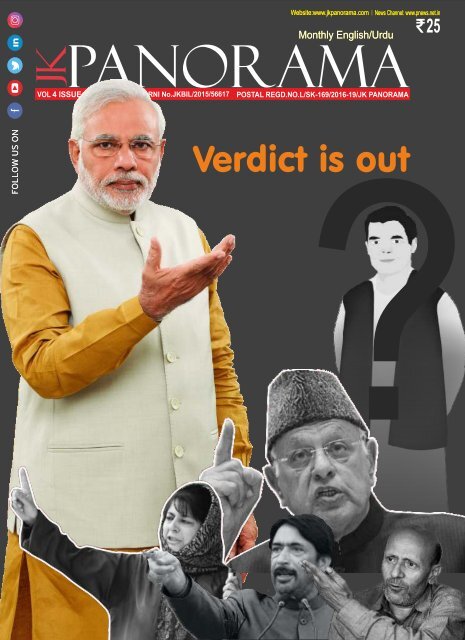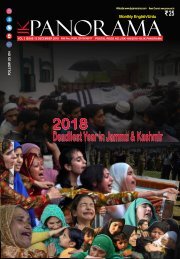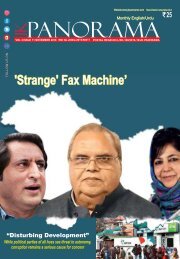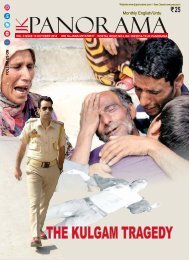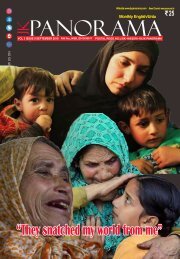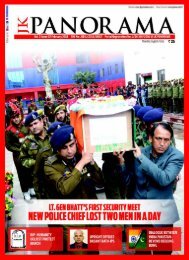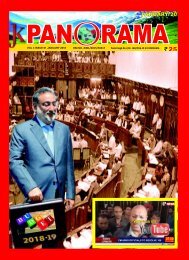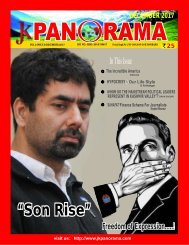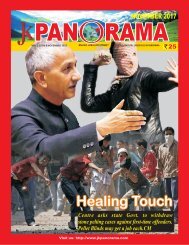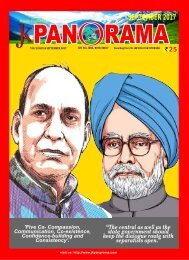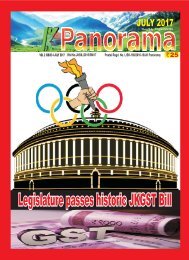Create successful ePaper yourself
Turn your PDF publications into a flip-book with our unique Google optimized e-Paper software.
Verdict<br />
?<br />
is out
02 May 2019
05<br />
<strong>VOL</strong> 4 <strong>ISSUE</strong> 5 <strong>MAY</strong> 2019<br />
06<br />
Verdict is out<br />
17<br />
Why Rahul Gandhi Failed?<br />
08 How Hinduism Became<br />
a Political Weapon in India<br />
18<br />
Who was Zakir Musa?<br />
11<br />
Pak downplays Imran Khan<br />
not being invited for Modi's inauguration<br />
19<br />
Rape of Minor in Kashmir:<br />
Allegation Which Sparked Protests<br />
Negated by Medical Report<br />
12<br />
Governance, not Politics!<br />
14<br />
Quran in Dogri<br />
20<br />
The Battle of Badr<br />
22<br />
Five, six and seven<br />
03 May 2019
95.000 +<br />
04<br />
May 2019
05 May 2019
Verdict is out<br />
This is the time to ponder<br />
BY: BINOO JOSHI<br />
The BJP has won national<br />
elections with an<br />
overwhelming majority- it has<br />
300 of them on its own and combined<br />
strength of the National Democratic<br />
Alliance is veering around in the Lok<br />
Sabha that has a total of 543 seats .<br />
Prime Minister Narendra<br />
?<br />
Modi is all<br />
set to begin his new<br />
innings in not so<br />
ideal times for the<br />
country despite the<br />
fact that he has made<br />
the world to change<br />
its ways of looking<br />
at India. The country<br />
is in the major<br />
international<br />
discourse. There is a<br />
grudging feeling<br />
about its economic<br />
progress and the<br />
resoluteness with<br />
which it has stayed<br />
06 May 2019
democratic course against all odd has not<br />
gone without appreciation. This is what<br />
many prefer to call Modi's India. There are<br />
fault lines staring at every step within the<br />
nation, and the verdict while having shown<br />
complete saffron colour in most parts of the<br />
country, it has also shown political.<br />
Ideological and economic divisions.<br />
How it plays out in Jammu and Kashmir<br />
where voters have given a split verdict. The<br />
Bhartiya Janta Party has reigned supreme in<br />
the Hindu plains and the cold desert region<br />
of Ladakh. That the victory margins of the<br />
BJP candidates this time were huge is rooted<br />
in the fact that a volcano was waiting to<br />
erupt, and it erupted. There was so much of<br />
anger amongst the people who voted more<br />
than 70 per cent in the two constituencies of<br />
Jammu that they gave vent to it in their<br />
votes. Their choice of Modi in the elections<br />
was deliberate. Since Modi is the iconic<br />
figure of the saffron party, it won. There is<br />
no other reason. In Jammu region the BJP<br />
sought votes in the name of Prime Minister<br />
Narendra Modi in Municipal polls too. That<br />
means that, unless or until they feature Modi<br />
in their campaign, Jammu cannot hope to<br />
win even the Municipal polls.<br />
This has a great advantage that Jammu<br />
stands solidly behind one leader as it trusts<br />
his abilities to deliver on the promises. No<br />
doubt muscular narrative formed core of the<br />
campaign that swept the minds of the voters<br />
who believed that Pakistan that has flashed<br />
almost permanently on their radar as their<br />
tormentor has been taught a lesson by Modi,<br />
but there was something more than that too.<br />
It was that Jammu wanted to avenge its<br />
assumed humiliation in all sectors, and<br />
simultaneously make a point that it has<br />
linked its future with the rising political<br />
power of the country.<br />
The flip side however is that such an attitude<br />
in the elections makes the political party that<br />
swamped all other rivals to take the voters<br />
for granted. Jammu has had an experience of<br />
it, quite a bitter one. This is also a way of<br />
not taking the past into calculations and<br />
blind faith in the future. How far the voters<br />
were correct in doing so would be known in<br />
the days, weeks and months to come. For<br />
the time being Jammu plains have turned<br />
saffron.<br />
Jammu's hilly areas have not been that<br />
unanimous in going with the saffron party.<br />
For two reasons – one the demography of<br />
the hills where Muslims dominate, and the<br />
Hindus who have their own problem of<br />
identity crisis, voted differently. Their task<br />
was made easier by the National Conference<br />
and PDP in the elections. This absence made<br />
the people to look forward to the divisions<br />
as a solution rather than bridging the same.<br />
Congress, in any case, fought these elections<br />
half-heartedly. This has serious<br />
repercussions in the future elections,<br />
especially when the Assembly polls would<br />
be announced and held in the state.<br />
Congress is nearing its burial site because of<br />
its divisions and groupism. When NC and<br />
PDP and Congress, though quite decimated<br />
in the aftermath of the general elections, will<br />
fight Assembly elections on their respective<br />
symbols, they would be staring at the repeat<br />
of the 2014 in hills of Jammu, where if they<br />
fight jointly can win at least 10 seats out of<br />
13 in Chenab Valley and Pir panjal region.<br />
Kashmir has voted for National Conference<br />
in the parliamentary elections. The initial<br />
review of the segment wise voting has given<br />
a clear edge to the party of Abdullah's.<br />
Maintaining that picture is not sufficient for<br />
National Conference to form government on<br />
its own. The voting patterns and the public<br />
mood would be different in the Assembly<br />
elections. And by the time the state goes to<br />
Assembly polls, much of the anger that the<br />
voters, howsoever small their number was in<br />
the parliamentary polls, would have faded ,<br />
if not gone altogether. Then, there are<br />
forces with their individual following and<br />
political experience that sided with National<br />
Conference or its rivals, particularly in<br />
north Kashmir, that will also take their share<br />
of votes. Where does it place the Kashmir<br />
politics? It is time to ponder.<br />
07 May 2019
How Hinduism Became a Political Weapon in India<br />
India The seven pandits draped in cloth of<br />
gold are clearly competing against the five<br />
in saffron. In front of thousands of<br />
assembled pilgrims, each bevy of priests<br />
furiously recites Sanskrit chants, deftly<br />
swinging pyramids of flaming oil lamps,<br />
banging on bells and blowing on conch shells,<br />
wafting thick clouds of incense over the<br />
moonlit waters of the limpid, unlistening<br />
Ganges. The celebration of Ganga Aarti has<br />
taken place daily at this spot for hundreds, or<br />
perhaps thousands, of years.<br />
This is Hinduism. But it is not Hindutva, the<br />
creed of the governing Bharatiya Janata Party<br />
(BJP). And the difference between them<br />
between the practices of faith and<br />
politics—may determine the future of what<br />
will soon be the largest nation on Earth.<br />
Here in Varanasi, posters of Prime Minister<br />
Narendra Modi are slapped on crumbly<br />
ancient walls, splintery doorjambs, a tangle of<br />
electrical wires draped perilously over a traffic<br />
circle. Orange-and-green flags bearing the<br />
lotus leaf of the BJP flutter on bicycle<br />
rickshaws, rooftops, and rowboats plowing<br />
their way along the holy Ganges. In much of<br />
the city, these are the only election signs one<br />
can see: You generally have to dive into the<br />
twisty alleyways near a mosque to find a few<br />
timid banners for the Indian National Congress<br />
or any other BJP rival.<br />
The city of Varanasi is the holiest site in the<br />
Hindu faith. It is also, not coincidentally, the<br />
parliamentary constituency of Modi, who has<br />
just won a second five-year term. He did it, in<br />
large measure, by emphasizing Hindutva, an<br />
ideology that seeks to reformulate Hinduism<br />
into something that most practitioners'<br />
grandparents would barely understand.<br />
BY: JONAH BLANK<br />
Religions change—that's as timeless as time.<br />
But the transformation currently under way in<br />
Hinduism is among the most significant in<br />
modern history. It has much in common with<br />
similar changes taking place in Islam,<br />
Buddhism, and Christianity: Why are so many<br />
radical Islamists poorly versed in the Koran?<br />
How can Buddhist monks sworn to<br />
nonviolence lead pogroms in Myanmar and Sri<br />
Lanka? Why do evangelical Christians care so<br />
much about issues never mentioned by Jesus,<br />
such as abortion and homosexuality? The<br />
answer is not always hypocrisy. For many<br />
today, religion is less a matter of what you<br />
believe, or even what you do, than of who you<br />
are.<br />
The term Hindutva can be (sort of) translated<br />
as “Hindu-ness,” and that gets (sort of) at what<br />
it's all about: Hinduism not a theology, but an<br />
identity. The movement's intellectual father,<br />
Veer Savarkar, wrote its foundational text<br />
(helpfully titled Hindutva) a century ago. At<br />
the time, the notion of a unified faith or<br />
doctrine, let alone a shared identity, would<br />
08 May 2019
have left most Hindus simply confused:<br />
Identity was determined by a person's family,<br />
village, caste. The very term Hindu is merely a<br />
loanword (most likely from Persian), referring<br />
to “the people who live across the Indus<br />
River.” Until the 20th century, most Hindus<br />
had never felt the need to describe themselves<br />
in any comprehensive way.<br />
It was the colonial experience that created<br />
Hindutva: Why, Savarkar and his comrades<br />
wondered, had India been dominated for<br />
centuries by a relatively small number of<br />
Muslim Mughals and Christian British? Was<br />
Swayamsevak Sangh, or RSS—the primary<br />
vehicle for Hindutva mobilization) are both<br />
described as having been atheists or agnostics.<br />
The point wasn't doctrine, but branding.<br />
The only figure who did more to reshape<br />
Hinduism than the Hindutva founders was<br />
Mahatma Gandhi. His vision of the faith was,<br />
in many ways, the absolute inverse of<br />
Hindutva: He cared nothing about branding,<br />
and a great deal about belief. It was an ideal so<br />
familiar today that one can easily forget what a<br />
break from the past it represented. Gandhi's<br />
radical embrace of nonviolence drew not only<br />
monotheism simply better suited for ruling? If<br />
so, what did that mean for a faith with more<br />
deities than days in the year? During the<br />
founding decades of the Hindutva movement,<br />
much effort revolved around making<br />
Hinduism more like its rivals: building a single<br />
shared identity to unite everyone for whom<br />
India was, in Savarkar's words, “his Fatherland<br />
as well as his Holy-land.” This definition<br />
c o n v e n i e n t l y r o p e d i n S i k h s ( a<br />
disproportionate number of whom served in<br />
the army), Buddhists (whose spiritual cachet<br />
helped give the movement credibility), and<br />
Jains (who tended, then and now, to be quite<br />
rich).<br />
What it pointedly did not do was dictate what<br />
this newly lumped-together group of people<br />
should believe. Indeed, very few of Hindutva's<br />
leading lights have been holy men, or even<br />
particularly devout; Savarkar and K. B.<br />
Hedgewar (the founder of the Rashtriya<br />
from Hindu tradition, but, as he famously said,<br />
also from the Sermon on the Mount, from<br />
Buddhist texts, and even from Leo Tolstoy.<br />
After a member of Savarkar's group<br />
assassinated Gandhi in 1948, the entire<br />
Hindutva movement was discredited for a<br />
generation.<br />
Fast-forward to 2019: Gandhi's murderer has<br />
been praised as a “patriot” by a candidate<br />
running on Narendra Modi's ticket, and while<br />
the prime minister has said he disagrees with<br />
the remark, he did not withdraw his party's<br />
backing. (The candidate won.)<br />
Varanasi was not always a Hindutva<br />
stronghold. Instead, it was long held by<br />
Congress, the party of Gandhi and India's first<br />
prime minister, Jawaharlal Nehru. When Modi<br />
ran for the seat five years ago, he hedged his<br />
bets by simultaneously contesting from a safer<br />
constituency in his native state of Gujarat (you<br />
can do that in India's parliamentary system).<br />
09 May 2019
Although he was a lifelong RSS member,<br />
Modi explicitly refrained from running on a<br />
Hindutva platform, using the slogan “Toilets,<br />
not temples” to emphasize his commitment to<br />
an earnest, technocratic, getting-things-done<br />
attitude.<br />
But getting things done requires … getting<br />
things done. Modi has instituted some<br />
economic reforms, but after an initial spurt, the<br />
economy's growth rate has slowed. New<br />
investments have fallen since Modi took<br />
office, and his promise of extensive job<br />
creation remains largely unfulfilled. His<br />
signature demonetization effort (taking the<br />
vast majority of banknotes out of circulation)<br />
made many families' life savings valueless and<br />
caused hardship to almost everyone.<br />
To compensate, Modi and his followers<br />
ramped up the Hindutva pitch. First came the<br />
“love jihad”—false accusations that Muslim<br />
men were wooing and impregnating Hindu<br />
women to change India's demographic balance<br />
(Muslims make up about 14 percent of the<br />
population, Hindus about 80 percent). Next<br />
came the “cow protection” lynchings in BJPcontrolled<br />
states such as Uttar Pradesh (UP):<br />
Gangs of Hindu men killed Muslims whom<br />
they falsely accused of eating beef. Cow<br />
slaughter has been banned in several Indian<br />
states by non-BJP governments, but it had<br />
never led to widespread attacks egged on by<br />
government officials.<br />
Perhaps most ominously, in 2017 Modi<br />
appointed the radical priest Yogi Adityanath as<br />
chief minister of UP, India's largest state.<br />
Adityanath's militancy makes Modi seem<br />
almost moderate—and Adityanath openly<br />
covets his patron's office. To top it all off, over<br />
the past half year, Modi has engaged in the<br />
most serious armed combat with Muslimmajority<br />
Pakistan in two decades. Pakistan<br />
prompted the action, but Modi's changing his<br />
Twitter handle to Chowkidar(“Watchman”),<br />
and encouraging his supporters to do likewise,<br />
was purely his own choice.<br />
This is Hindutva. But it is not Hinduism. The<br />
stakes here are not faith or practice—nobody is<br />
threatening to stop Varanasi's pandits from<br />
making their Ganga Aarti. Instead, the issues<br />
are those of identity: We're being outbred by<br />
minorities. We're being laughed at by the<br />
world. We're overrun with immigrants—and<br />
you know what kind. We're second-class<br />
citizens in our own nation. Make India Great<br />
Again.<br />
From the distance of Delhi, it can look as if<br />
Hindutva was the determining factor in this<br />
election—and perhaps the driving force in<br />
India's political future. But so many things in<br />
India resemble Schrödinger's cat: They<br />
simultaneously are and are not. Yes, Hindutva<br />
dominated the national debate. Yes, Modi ran<br />
on Hindutva themes. And, yes, voters<br />
responded to them in a way that strengthens the<br />
power of Hindutva as a political and social<br />
creed. But to a large degree, the success of<br />
Hindutva today lies less in its ideology than in<br />
its rebranding of prosaic, everyday concerns as<br />
matters of personal identity: When Modi<br />
speaks, many voters feel, he's speaking for me.<br />
In more than a dozen interviews on polling day,<br />
not one voter in Varanasi raised issues such as<br />
the “love jihad” or the cow slaughter as a<br />
reason for either supporting Modi or opposing<br />
him. The rationales that both his fans (the large<br />
majority here) and his foes (a not-insignificant<br />
minority) gave were remarkably similar: He<br />
had, or had not, gotten things done. None of<br />
them knew whether the GDP per capita had<br />
gone up or down, and none of them cared.<br />
Modi's most ardent admirers spoke of vikas<br />
(“development”) and swasti (“success”). Said<br />
a shop assistant named Yogis Dubey outside<br />
the polling station at Gurudham Chauraha:<br />
“Kashi ko saaf benaiya!” (“He made Varanasi<br />
clean!”).<br />
The streets of India's holiest city are, in fact,<br />
still thick with the excrement of goats, sheep,<br />
dogs, pigs, water buffalo, and herds of<br />
auspicious cattle. But that's not really the<br />
point: Hindutva is not about what your eyes tell<br />
you; it's about what your heart tells you. It's not<br />
about what you see; it's about how you see<br />
yourself. How you see your identity, your<br />
brand, your place in the world. Understand<br />
this, and you can better understand the changes<br />
under way in India. ( The Atlantic )<br />
10<br />
May 2019
Pak downplays Imran Khan<br />
not being invited for Modi's inauguration<br />
Pakistan has tried to downplay India's<br />
decision not to invite Imran Khan for<br />
Narendra Modi's swearing-in, claiming<br />
that the Indian Prime Minister's “internal<br />
politics” do not permit him to extend an<br />
invitation to his Pakistani counterpart.<br />
The government announced in New Delhi that<br />
it has invited leaders from BIMSTEC countries<br />
to Prime Minister Modi's inauguration, leaving<br />
out Pakistan, which is not a part of the seven<br />
member regional grouping. The BIMSTEC<br />
(Bay of Bengal Initiative for Multi-Sectoral<br />
Technical and Economic Cooperation)<br />
comprises Bangladesh, India, Myanmar, Sri<br />
Lanka, Thailand, Bhutan and Nepal.<br />
Reacting to reports that India has not invited<br />
Prime Minister Khan to Prime Minister Modi's<br />
inauguration, Foreign Minister Shah Mehmood<br />
Qureshi said a meeting for the sake of dialogue<br />
to find a solution to the Kashmir issue, as well<br />
as Siachen and Sir Creek disputes, would have<br />
been a significant measure instead of attending<br />
the swearing-in ceremony. “His (Prime<br />
Minister Modi's) entire focus (during the<br />
election campaign) was on Pakistan-bashing. It<br />
was unwise to expect that he can get rid of this<br />
narrative (soon),” Qureshi was quoted as saying<br />
by Dawn news. “India's internal politics did not<br />
permit him to extend an invitation,” he said.<br />
Modi and Khan are scheduled to attend the<br />
Shanghai Cooperation Organisation (SCO)<br />
summit in Kyrgyzstan next month. In 2014,<br />
then Pakistan premier Nawaz Sharif had<br />
attended Prime Minister Modi's swearing-in<br />
held on May 26 in New Delhi when the leaders<br />
of SAARC countries were invited. Speaking to<br />
Geo News on Monday, Qureshi said Modi had<br />
congratulated Khan after he won the general<br />
election last year and wrote a letter as well.<br />
Prime Minister Khan, breaking the ice in<br />
bilateral ties, spoke to his Indian counterpart<br />
Modi on Sunday and expressed his desire to<br />
work together for the betterment of their<br />
peoples. “Relations between the countries were<br />
based on reciprocity and PM Khan had<br />
congratulated Mr Modi as a goodwill gesture,”<br />
the Pakistani foreign minister said.<br />
“Finding a new way (to resume dialogue) is also<br />
essential for them (India). If he (Modi) wants<br />
development of this region… the only way is to<br />
sit with Pakistan to find a solution. “It is in the<br />
interest of Pakistan to defuse tensions…<br />
Pakistan did not create tension,” Qureshi said.<br />
Prime Minister Modi on Thursday led his<br />
Bharatiya Janata Party to a landmark victory for<br />
a second five-year term in office, winning 303<br />
seats in the 543-member Lok Sabha. Tensions<br />
flared up between India and Pakistan after a<br />
suicide bomber of Pakistan-based Jaish-e-<br />
Muhammed (JeM) killed over 40 CRPF<br />
personnel in Kashmir's Pulwama district on<br />
February 14. Amid mounting outrage, the<br />
Indian Air Force (IAF) carried out a strike on<br />
what it termed as the JeM training camp in<br />
Balakot on February 26. The next day, Pakistan<br />
Air Force retaliated and downed a MiG-21 in an<br />
aerial combat and captured an IAF pilot, who<br />
was handed over to India.<br />
11<br />
May 2019
Governance, not Politics!<br />
By: Muhammad Ashraf Bukhari<br />
12<br />
May 2019
13<br />
May 2019
Quran in Dogri<br />
Azra Choudhary, translating Quran in Dogri<br />
Azra replies with message of peace to a region<br />
where her mother-daughter suffers horrors of 1947<br />
By: Haroon Mirani<br />
In 2014 when Azra Choudhary, 62, former<br />
chief editor Dictionary section at Jammu<br />
Kashmir Academy of Art Culture and<br />
Languages (<strong>JK</strong>AACL) was approached by<br />
Rajouri based Shah Hamdan Trust to translate<br />
the Holy Quran in Dogri language, she was<br />
reluctant. It was a huge responsibility as she<br />
was not confident enough to accomplish it.<br />
Abdul Qayoom Nadvi, principal of a<br />
school in Rajouri, who had<br />
contacted Azra for the job, knew that<br />
if anybody could do justice with this<br />
work, it was Azra. Qayoom had once<br />
asked his wife Shamima who was<br />
working as Additional Secretary<br />
<strong>JK</strong>AACL too about the right person<br />
who can translate Quran in Dogri.<br />
Shamima without any hesitation<br />
said that Azra was the right person to<br />
do the job. Both Qayoom and<br />
Shamima are members of Shah<br />
Hamdan Society which is a religious<br />
and social work<br />
As Dogri was included in the eighth<br />
schedule and it had good number of<br />
speakers in Jammu and Himachal<br />
Pradesh, the society felt that it is the<br />
need of the hour to translate Quran in<br />
Dogri language so that its message<br />
of peace, love, brotherhood reaches<br />
a larger population. As of now Quran<br />
is translated in all major languages<br />
of the world numbering more than<br />
100 but Dogri translation was<br />
14<br />
May 2019
missing.<br />
Azra was indeed the best choice for the job.<br />
Not only was she a talented editor but she had<br />
a Masters in both Hindi and Dogri. Her work<br />
on Hindi-Dogri dictionary project and Dogri<br />
translation of various stories in Sheeraza were<br />
already well received.<br />
As Azra was yet to make her mind, Qayoom<br />
philosophically told her, “Ye aap hi ne karna<br />
hai.” (It is only you who has to do this work.”<br />
“The words touched my heart and I thought if<br />
this was my destiny why am I resisting. And I<br />
took up the job” said Azra. She politely<br />
refused any remuneration and assured<br />
Qayoom that she will take care of everything<br />
herself. Thus started a journey that saw Azra<br />
immersing in the holy scripture.<br />
“It was not any ordinary book. I had to do<br />
ablutions before starting the work. At my<br />
office my job was hectic as I had to almost<br />
single handedly take out the Hindi version of<br />
Sheeraza magazine. So whenever I got time<br />
like on mornings, evenings, Sundays and on<br />
holidays I would do the translation work,”<br />
said Azra.<br />
Qayoom had asked her to start with the last<br />
section, 30th Para, of the Quran, as it had<br />
small surahs. The first draft was to be<br />
evaluated to check whether the translation<br />
was going in right direction. The verification<br />
and counter checks indicated all was going<br />
well and Azra was given green signal for the<br />
entire Quran.<br />
The 30th para was published separately and<br />
released by Maulana Wahiduddin Khan in<br />
Delhi. Thereafter started the work that<br />
required almost five years of disciplined<br />
work. “In translating a religious book, one has<br />
to take care of every single word, otherwise a<br />
single mistake, even a smaller one, can harm<br />
the entire exercise. So I had to check, recheck<br />
and proofread my translation four times to<br />
ensure there was no mistake,” said Azra. “I<br />
would take the translation back and forth to<br />
Qayoom, where we would compare it with the<br />
original and other translated text to ensure<br />
accuracy.”<br />
She also consulted Wahidudin's Tazkeerul<br />
Quran for making translation as accurate as<br />
possible.<br />
After Azra retired as Chief Editor, Dictionary<br />
Section from <strong>JK</strong>AACL in 2017, the<br />
translation became her full time job.<br />
Azra feels that everything that she had done<br />
and experienced in her life combined to help<br />
her in the better translation. Being a religious<br />
minded person Azra had a chance to look at<br />
the words of Quran at an altogether new level.<br />
“During this course of time I could see Quran<br />
in a new light. There are so many things which<br />
became clear and I could understand them in a<br />
better way. It was a spiritual kind of<br />
experience,” said Azra. “During Ramadhans I<br />
wouldn't do the separate tilawat but just<br />
worked on the project as I felt it was one and<br />
same.”<br />
Azra feels that it was her destiny to do the<br />
translation. After her MA (Hindi) in 1978, B<br />
Ed in 1985 and MA (Dogri) in 1987, she was<br />
appointed as a government teacher. She<br />
worked for seven years before she came upon<br />
an advertisement from <strong>JK</strong>AACL inviting<br />
candidates for a post of research Assistant in<br />
Dogri Dictionary section. The eligibility was<br />
that the candidate should have MA in both<br />
Hindi and Dogri, which Azra possessed. She<br />
easily qualified the interview, started the<br />
work, enriched her vocabulary and gained<br />
experience, which ultimately took her to<br />
become part of elite group of Quran<br />
translators.<br />
During the education, it was her mother Razia<br />
Choudhary that was her support. She was<br />
keen to get her children, especially girls<br />
educated. She never stopped her two daughter<br />
from education and also extra curricular<br />
activities. “She was of the opinion that it is<br />
extremely important for girls to experience<br />
the world. If they remain ignorant, they will<br />
suffer. She would let us go to picnics, NCC<br />
camps, do sports and other activities. She<br />
would just advise that do all the activities only<br />
take care of our dignity,” said Azra. “Her goal<br />
was to make every girl self dependent.”<br />
It was after experiencing the hard lessons of<br />
life that Razia knew how important education<br />
was for girls. She herself was educated till<br />
fifth grade, but she felt that had she been<br />
15<br />
May 2019
educated more, her life story would have been<br />
different.<br />
Razia was the daughter of a landlord<br />
Choudhary Abdullah Khan of RS Pora in<br />
Jammu. In 1946 Razia was married to<br />
Choudhary Ghulam Ahmad of Miran Sahib.<br />
In 1947 when the communal riots broke in<br />
Jammu, Ahmad and other Muslims shifted<br />
women folk to a Hindu friend's glass factory<br />
for safety. However, during November riots<br />
the area was run over by Hindu mobs, who<br />
killed, looted and raped at ease. After the men<br />
were killed, the mob distributed the women<br />
among themselves like a war booty. Razia was<br />
taken by one Balwan Singh of Thub Village<br />
Jammu after she was told her entire family has<br />
been killed.<br />
A young innocent girl who knew nothing of<br />
the world found herself helplessly chained<br />
with Balwan Singh who took her to Punjab.<br />
She gave birth to a son Karan Singh and two<br />
daughter Reva Rani and Anju. In 1965<br />
Balwan, an alcoholic, died and his family in<br />
Jammu disowned his family. However a<br />
patwari friend of Balwan gave Razia and her<br />
children a room to stay in New Plot, Jammu.<br />
Though poor, Razia took small time jobs, did<br />
stitching and tailoring only to ensure<br />
education to her children. She never<br />
compromised on it.<br />
Their life took another unexpected twist when<br />
in December 1974, during a visit to Tehsil<br />
office Jammu, Razia crossed paths with her<br />
ex-husband's sister, also her cousin, who had<br />
survived and had been living in Dalpatian,<br />
Jammu. It was an emotional reunion and both<br />
cried bitterly.<br />
With regular contact now established, Razia<br />
came to know that many of her close relatives<br />
including husband, mother in law, mother and<br />
eight sisters had miraculously survived and<br />
are living in different locations in Jammu and<br />
Pakistan.<br />
Few months later Razia and her family bid<br />
farewell to the old nightmares and shifted to<br />
Dalpatian. She came to know that her exhusband<br />
after surviving had crossed over to<br />
Sialkot. He returned few years later and<br />
unable to find her husband married another<br />
woman.<br />
In the communally charged atmosphere of<br />
1974, Razia and her family took a bold step to<br />
convert back to Islam. Karan Singh remained<br />
Karan Singh but Anju became Zarina and<br />
teenage Reva Rani became Azra Choudhary.<br />
A local Molvi taught Azra, nimaz and Quran.<br />
Razia along with Zarina shifted to Pakistan in<br />
1979 to be with her mother and eight sisters.<br />
Azra couldn't accompany as she didn't get a<br />
passport as her school records still showed her<br />
name as Reva. As destiny had other plans for<br />
Azra, she stayed in Jammu, got education,<br />
married and got employed and ultimately was<br />
chosen for the first ever translator of Quran in<br />
Dogri.<br />
The tumultous life of Razia and Azra was also<br />
detailed by former IGP Kashmir Javid<br />
Mukhdoomi in one of his write-ups.<br />
Last month when Maulana Wahiduddin<br />
released the Dogri Translation of Quran, it<br />
was an accomplishment worth celebrating<br />
and a culmination of a long struggle to inner<br />
peace.<br />
The translation was by a daughter who was<br />
born Hindu to a Muslim mother and whose<br />
life was nothing short of a nightmare. “I give<br />
credit to my mother whose fearlessness made<br />
me what I am today. She would often say had I<br />
been educated more, had I seen the world<br />
outside of my Purdah and had I not been such<br />
an innocent that I believed whatever others<br />
said, I would not had suffered so much,” said<br />
Azra. Her mother died in 1999 in Sialkot and<br />
sister Zarina lives in USA.<br />
As every one asks Azra what are her future<br />
plans in writing, she says that she has now<br />
dedicated her life to Islamic work only.<br />
Maulana Wahiduddin was so impressed with<br />
her work that he gave her a book of Hadith in<br />
Urdu to be translated to Hindi and a Seerat<br />
book in Hindi to be translated into Dogri.<br />
Azra feels that the translated version will have<br />
a greater outreach among people and they will<br />
come to know about the message of peace<br />
and love contained in it.<br />
16<br />
May 2019
Why Rahul Gandhi Failed?<br />
By : VINOD CHANDRASHEKHAR DIXIT<br />
The decline and fall of the Congress is<br />
an arresting story written time and<br />
again; but this time the party is at the<br />
nadir of its influence in politics. The results<br />
are a lesson for the Congress Party; it is on a<br />
steady decline in the country's political<br />
arena. The Congress' revival pivots on its<br />
ability to address its crisis of credibility,<br />
encouraging state leaders, and functioning as<br />
a vigorous Opposition in Parliament.<br />
Recently , TIME magazine stated that the<br />
Congress party has “little to offer other than<br />
the dynastic principle, yet another member<br />
of the Nehru-Gandhi family” and that the<br />
party lacks “political imagination”,<br />
something that demonstrated by the<br />
Congress choosing to bring Priyanka<br />
Gandhi-Vadra — Rahul Gandhi's sister —<br />
into the Indian political arena. Priyanka's<br />
entry in to active politics was a long-term<br />
wish of many Congress workers. She<br />
reminds them of Indira Gandhi's attractive<br />
pleasing personality and is a new face for<br />
the Congress. It is also observed that such<br />
personalities sometimes increase the vote<br />
share by 5 to 7 per cent but that also did not<br />
happen. She brought with her the grace of<br />
Gandhi Nehru lineage and her immense<br />
personal charm. But she has mostly stayed<br />
in the shadow of her brother Rahul, heirapparent<br />
of the Nehru-Gandhi dynasty.<br />
One would have observed that the decline<br />
and fall of the Congress is an arresting story<br />
written time and again; but this time the<br />
party is at the nadir of its influence in<br />
politics. Rahul Gandhi by wearing his Hindu<br />
identity on his sleeves is taking the 'Bull' by<br />
its horns. . Though Rahul's elevation to<br />
Congress President is imminent, the<br />
challenges before him are immense. Many<br />
years of congress party rule of India has<br />
passed with poverty still keeping hold of the<br />
farmers and<br />
other poor<br />
people, dirt and<br />
squalor in the<br />
environment<br />
and corruption<br />
and black<br />
money<br />
laundering<br />
persisting in<br />
Indian society.<br />
This has<br />
naturally<br />
become a cause<br />
of concern for<br />
Congress cadres<br />
who feel that<br />
Rahul Gandhi's<br />
inability to<br />
learn on the job<br />
even after more<br />
than 12 years in<br />
Parliament has<br />
put a serious<br />
question mark on the party's future and their<br />
own political survival. Rahul had promised<br />
that farmers' entire loan will be waived in 10<br />
days of the government's formation in the<br />
state but failed. They took vote on promising<br />
entire loan waiver but the government failed<br />
to deliver<br />
It is clear that Rahul Gandhi's hurdles in<br />
congress are his inexperience and his<br />
inaccessibility. His image is also an aloof<br />
one. He doesn't feel he has to have his own<br />
mouthpiece website and mobile application<br />
to make himself more accessible to people.<br />
Rahul Gandhi has different plans in mind<br />
but it does not work. Why ? He may seem<br />
extremely well intentioned but does that<br />
translate to an effectual administrator and<br />
visionary leader.<br />
17<br />
May 2019
P News<br />
Who was Zakir Musa?<br />
Zakir Musa succeeded Burhan Wani as<br />
the Amir of Hizbul Mujahideen (HM)<br />
for a while before quitting it to form his<br />
own group, owing to ideological differences.<br />
On May 23 2019, a joint operation by Indian<br />
Army's 42 Rashtriya Rifles (RR) and a Special<br />
Operations Group (SOG of <strong>JK</strong>AP) of the<br />
Jammu and Kashmir Police successfully<br />
eliminated one of the most-dreaded terrorists of<br />
the Valley.<br />
Ansar Ghazwat-ul-Hind Chief Zakir Musa was<br />
holed up inside the house of a chemist in<br />
Dadsara village of Kashmir's Tral region, when<br />
he died in an encounter with the forces.<br />
The owner of the house where he was hiding<br />
was sent in for negotiation. However, Musa<br />
refused to surrender, reported Defence News.<br />
Zakir Musa has been on the most-wanted list of<br />
the forces for years. Two years ago, he was<br />
almost captured by the Indian Army but<br />
managed to flee as some stone-pelters gave him<br />
cover.<br />
Who is Zakir Musa?<br />
Zakir Rashid Bhat alias Zakir Musa hailed from<br />
a humble background, 28-year-old belonged to<br />
an educated, middle-class family in Noorpora;<br />
his father is a senior engineer with the state<br />
government, and one of his brothers is a doctor<br />
in Tral.<br />
Musa himself was a civil engineering student<br />
from a Chandigarh College. He was recruited to<br />
Hizbul Mujahideen in 2013 during one of the<br />
recruitment drives by then-Chief Burhan Wani.<br />
It happened while he was on a visit to his village<br />
for a vacation. The two remained close<br />
associates until 2016 when Indian security<br />
forces gunned down Wani.<br />
Musa succeeded Wani as the Emir of the<br />
militant outfit for a while before quitting it to<br />
form his own group, owing to ideological<br />
differences. The rift started developing with<br />
him repudiating a merger with Pakistan as the<br />
objective of his “jihad”.<br />
He openly announced his ambition to establish<br />
an Islamic Caliphate in Kashmir. He even<br />
issued death-threats to Hurriyat leaders for<br />
calling the Kashmiri struggle political and not<br />
Islamic. At this point, Hizb refused to back his<br />
statement, leading him to break away from its<br />
ranks.<br />
He soon came to symbolize a new generation of<br />
Islamist Jihadi operating in Kashmir. They<br />
were far more radical, violent, and actively<br />
using social media to profess their belief<br />
system. They were also typically slightly more<br />
educated than the militants of the past.<br />
Musa was also held in high regard in the<br />
Islamist militant circuit because of his<br />
association with the al-Qaeda. Since the time he<br />
launched the Ansar Ghazwat-ul-Hind, several<br />
youths in the Valley were seen brandishing al-<br />
Qaeda and ISIS flags.<br />
Last year, his group released a video where<br />
Musa could be seen exhorting Indian Muslims<br />
to attack Indian Army personnel and employees<br />
of companies looking at investing in India.<br />
They also published material that urged the<br />
Muslim youth to carry out lone wolf attacks<br />
across India.<br />
Paying tributes to Zakir Moosa, All Parties<br />
Hurriyat Conference chairman, Syed Ali<br />
Geelani said that whosoever strives for<br />
implementation of divine law in His land, with<br />
his conviction and dedication are the real heros<br />
of the movement and nation is indebted to hail<br />
their precious sacrifices.<br />
18<br />
May 2019
Rape of Minor in Kashmir:<br />
Allegation Which Sparked Protests Negated by Medical Report<br />
Photo Nasir Khan<br />
P News<br />
Two weeks after the incident, the medical<br />
report by SKIMS medical college,<br />
Bemina, has found insufficient<br />
evidence to confirm that the three-year-old was<br />
sexual assaulted.<br />
On the evening of May 12 in Kashmir's<br />
Bandipora area, when the news about the<br />
alleged rape of three-year-old girl broke, locals<br />
took to the streets in protest.<br />
On May 13, protests and clashes erupted across<br />
the Valley as people marched and demanded a<br />
death sentence for the accused. Dozens of<br />
youth were injured.<br />
However, two weeks after the incident, the<br />
medical report by SKIMS medical college,<br />
Bemina, has found insufficient evidence to<br />
confirm that the child was sexual assaulted.<br />
SKIMS, in its report submitted to Jammu and<br />
Kashmir Police, has stated that there were no<br />
marks of injury on any part of the body, thus<br />
contradicting the claims of the girl's mother.<br />
Making the case murkier, last week, the police<br />
said that the allegations of rape in the case had<br />
been proven and that a charge sheet would be<br />
filed soon.<br />
The accused, Tahir Mir, has already been<br />
booked under Protection of Children from<br />
Sexual Offences (POCSO) Section 3 and 5 and<br />
376 A, B and 342 RPC.<br />
The rape accused, as per the victim's family,<br />
allegedly committed the crime during iftar,<br />
when most of the villagers were at home or at<br />
the mosque.<br />
The mother, who found her daughter bleeding<br />
vaginally in a bathroom, said that she had<br />
handed over the blood drenched clothes of the<br />
girl to the Jammu and Kashmir Police at the<br />
time when the accused was arrested.<br />
The medical report, which is with The Wire,<br />
states that the actual source of bleeding could<br />
not be determined as there was no evidence of<br />
any injury around the vaginal orifice.<br />
“The blood stains were not dry blood but faint<br />
stains only and could not be scraped and sent<br />
for examinations,” the report reads.<br />
“It is very difficult to cause full penetration into<br />
the vagina without causing any major injury/<br />
tear/bleeding in a three-year-old child,” the<br />
report adds.<br />
The case has had a greater impact on the locals<br />
in the area, reportedly deepening the Shia<br />
Sunni divide, so much so that the family of the<br />
accused has left their village.<br />
Since the allegation surfaced, the Shia-Sunni<br />
coordination committee of religious scholars<br />
also appealed to the people to maintain calm<br />
and end protests as “police had nabbed the<br />
culprit”.<br />
As many as 12 people were injured in the<br />
massive protests. One person, Arshid Ahmad<br />
Dar, who was critically injured, later<br />
succumbed to his injuries at a Srinagar hospital.<br />
19<br />
May 2019
The Defensive War That<br />
Decisively Changed the World<br />
By: Adil Rashid Bhatt<br />
One of the grandest and profoundly<br />
immortal achievements of humanity<br />
has been the dramatic rise of<br />
magnificent Islamic civilization, on the<br />
blemished horizon of the forlorn world; it was<br />
purely founded on unshakable and integral<br />
faith and godly justice, inter alia natural<br />
longing to worship one true God. Islam rose as<br />
an enduring spiritual revolution that shook<br />
cultures, and nations cum echelons of power<br />
across the three continents within a short span<br />
of time of its ascendency, after the departure of<br />
Prophet Muhammed (SAW); and firmly<br />
established an empire, the Islamic Imperium.<br />
For the people of other faiths from Asia to<br />
Europe much of the history of Islam has been<br />
obscured behind the veil of fear, concoction,<br />
false propaganda and misunderstanding; still<br />
Islam' s forgotten history is intricately woven<br />
with civilizations across the nations; it has left<br />
deep imprints of its profound and magnificent<br />
culture and architectures across the world it<br />
ruled for a number of centuries. At a time when<br />
Europe languished in dark ages and reading<br />
science was penalized with excommunication (<br />
banishment) by the church Muslim scholars not<br />
only translated earlier works of Greek, Persian<br />
,and Indian scholars but , in fact, made great<br />
strides in different fields of science and arts that<br />
ultimately culminated in the transfer of<br />
knowledge to Europe and European<br />
renaissance.<br />
The rise of Islam was a revolution par<br />
excellence the like of which have had never<br />
been witnessed by the world. But all of this<br />
began with the life of single blessed man, and<br />
the profound message he proclaimed which<br />
changed the world for all times to come .This<br />
man was none other than the magnanimous<br />
“Prophet Muhammed”(PBUH) who was born<br />
in around 570AD in the sun blasted Arabian<br />
peninsula, a land of severe water famine whose<br />
unruly Bedouin tribes were locked in perennial<br />
state of bloody animosity, a violent people who<br />
even killed neighbors camel if that trespassed<br />
into their de facto territory, rivalry over the<br />
control of a single water well, that made<br />
difference between life and death, could<br />
provoke a bloody feud that would run into<br />
generations, and culminate in recurrent blood<br />
splashed skirmishes.<br />
There were myriad factions across the<br />
peninsula, each guarding its own territories<br />
,trade routes, and wells. These tribes would<br />
attack each other enroute, and plunder precious<br />
valuables that they later sold in markets. In<br />
Mecca, pagans had perched almost three<br />
hundred idols of different demigods into the<br />
Qaba, the sacred house built by Prophet<br />
Ibrahim (PBUH). Each clan worshipped their<br />
own god; in fact these God's were attributed to<br />
be harbingers of fortunes of many a kind and<br />
scale; some God's were supposed to be<br />
harbingers of rain ,and some were supposed to<br />
bring profit in trade and so on.<br />
The Holy Prophet(PBUH) preached against<br />
worshipping demi gods, and called people<br />
towards the powerful message of Islamic<br />
20<br />
May 2019
monotheism on the order of Allah-the Merciful.<br />
This raised feathers in the city of Mecca, and<br />
divided families, albeit for the time being, as<br />
people mostly youngsters keenly listened to<br />
Prophet Muhammed's message. The message<br />
from the most high God was in turn revealed to<br />
Prophet Muhammad(PBUH) by Angel<br />
Gabriel( Jibrail alaihisalaam). After the<br />
successive deaths of Prophets'(PBUH) uncle<br />
Abu Talib, and wife Hajirah(pbuh) pagan<br />
chieftains intimidated prophet to the core. And<br />
after failing to convince him to abandon<br />
preaching Islam in Mecca the pagan chieftains<br />
hatched a conspiracy to assassinate the Prophet<br />
Muhammad (PBUH) in which they miserably<br />
failed. (He was the chosen one who could not be<br />
killed). Prophet Muhammad (PBUH) had<br />
overnight migrated to Medina,after evacuating<br />
his followers to the same blessed place, along<br />
with Abu Bakr(RA) on the invitation of<br />
generous people of tribes of Medina who had<br />
sought the Prophet's(PBUH) leadership and<br />
guidance in amelioration of disputes cum in<br />
fighting, once for all.<br />
This landmark migration marks the beginning<br />
of Hegirah Calendar of Muslims. Many<br />
Muslims after being inflicted torture of<br />
indescribable pain by the pagan chieftains had<br />
already migrated to Abysinia ( modern day<br />
Ethiopia)on the orders of the Prophet(PBUH)<br />
to seek refugee under the Christian king. The<br />
pagan chieftains got infuriated after the king of<br />
Abysinia refused to return Muslims who had<br />
sought his refugee in time of need, and would<br />
knit the brow on coming to know about the<br />
prophet's(PBUH) leadership skills ,and kind<br />
treatment of him by the benevolent people of<br />
Yathrib(Medina), so much so that they<br />
plundered everything that Muslims had left<br />
behind in Mecca; and decided to trade that in<br />
Damascus, the ancient city.<br />
Initially, the prophet(PBUH) refused to fight<br />
because Allah had not ordered him to do so, but<br />
then Allah revealed “to fight against those who<br />
fight against you, and banish those from homes<br />
who banished you”. Thus Muslims numbering<br />
313 under the supreme leadership of Prophet<br />
Muhammad(PBUH),with meagre resources,<br />
reached to the field of Badr , a strategic trade<br />
route 70 miles away on the western side of<br />
Medina, where they captured all small and big<br />
water wells. All Meccan pagan chieftains<br />
assembled and decided to nip Muslims in the<br />
bud, once for all ,but their war mongering fell<br />
flat on the day, 17th Ramzan 2AH, they met<br />
Muslims face to face on the battle field. This<br />
was due to their obsessive stubbornness, that<br />
they were living in fool's paradise. While as<br />
pagans feasted throughout the night prior to the<br />
battle Prophet Muhammad (PBUH)<br />
worshipped to his guardian Lord. This<br />
remarkable quality of impeccable virtue set him<br />
aside from the pagans.<br />
Abu Sufiyan, who until then was outside the<br />
fold of Islam , schemed against Muslims and<br />
inflicted mammoth torture and pain upon<br />
them(before he entered Islam) played truant on<br />
the day of fighting. The outcome of the war was<br />
that almost all haughty pagan chieftains, like<br />
“Utbah”, “Umaiah”, “Abu Jahal”, elder son of<br />
Utbah Waleed( Utbahs younger son Huzaifa<br />
was Muslim and fought against Meccan<br />
pagans) , who issued incendiary statements<br />
against Prophet Muhammad(PBUH) ,and<br />
compelled him to migrate from Mecca were<br />
killed on the battlefield.<br />
The Prophet's(PBUH) close companions<br />
except Usman (RA) fought this battle. The<br />
victory was from Allah-the mighty, as alluded<br />
by Quran(3:123,3:124,3:125,3:126). A poorly<br />
equipped but spiritually and morally strong<br />
people ,313 in number, defeated a strength of<br />
more than 950 adequately resourced and well<br />
endowed force of the Quraysh. It is this battle<br />
that actually set the precedent for the success of<br />
other battles fought by Muslims against their<br />
adversaries in following years, and changed the<br />
face of the world. The prisoners of the battle<br />
were treated at par with other Muslims, and any<br />
prisoner who could teach ten Muslims would be<br />
freed, as ordered by the Prophet of wisdom<br />
(PBUH). Jabir relates: The most important<br />
thing that one must take cognizance of is that all<br />
the battles fought by Muslims under the<br />
supreme leadership of Prophet Muhammad<br />
(PBUH) were defensive in nature like the battle<br />
of Badr.<br />
21<br />
May 2019
5<br />
6 &<br />
7<br />
Five, six and seven<br />
Shantiveer Kaul<br />
The Pali Canon of Buddhism talks of a<br />
'sixth' element. For students of<br />
Orientalism this may be a tad amusing.<br />
After all, the whole of Orient has been brought<br />
up on the diet of five elements – air, fire, water,<br />
earth and ether. Wu Xing of China may not<br />
correspond exactly with the Godai of Japan,<br />
but the latter is very much like the concept of<br />
tattvas in Indian traditions. Chinese, Japanese<br />
and Indian philosophies have dwelt at length<br />
on the number 'five'. Many other articles of<br />
other faiths and their religious practice revolve<br />
around this number. According to the Greek<br />
mathematician and philosopher Pythagoras,<br />
five was the number of man, because of the<br />
fivefold division of the body, and the ancient<br />
Greek division of the soul. According to<br />
Pythagoras, the five points of the pentagram<br />
each represent one of the five elements that<br />
make up man: fire, water, air, earth, and<br />
psyche. But the 'psyche' of Pythagoras, which<br />
replaces the 'ether' of the Oriental traditions<br />
gets transformed into 'consciousness' and<br />
becomes the sixth element of the Pali canon<br />
alluded to above.<br />
When five becomes six where does it leave the<br />
five and what becomes of the sixth? Long<br />
before Panchayati Raj was the subject matter<br />
of any legislation and even longer before it got<br />
onto paper to remain on paper as it does now in<br />
Jammu and Kashmir, long ago – when another<br />
freshly minted dream called Naya Kashmir<br />
was in the process of similarly getting<br />
marooned on paper, we witnessed the rise and<br />
rise of the sixth element – the khadpanch. The<br />
word khadpanch literally means the sixth<br />
Panch, 'khad' being the derivative prefix used<br />
for number six in the plains of Indian<br />
subcontinent from where the term, and the<br />
phenomenon, both were imported. Now a<br />
panchayat of yore would only have a<br />
committee of five, four Panches and a<br />
Sarpanch, dispense village level community<br />
justice. A khadpanch was thus extra-legal. By<br />
implied usage he was also less than savoury as<br />
far as his morals and methods were concerned<br />
but more than savvy in the matter of his street<br />
smartness. The khadpanch would classically<br />
have some distinguishing features – first of all,<br />
the swagger. One could easily make out who<br />
the village khadpanch was by the manner of his<br />
carriage. Secondly, he would have this<br />
expertise of positioning himself in a manner<br />
that can best be described as 'solus next to<br />
prime' or separate and alone while being next<br />
to the VIP. This positioning would give the<br />
khadpanch a unique aura. No fawning acolyte<br />
was he, but almost a peer. The third thing that<br />
characterized a khadpanch was his speech.<br />
Without his actually using the royal pronoun it<br />
would sound as if he did. He would also sound<br />
as a plenipotentiary or sole spokesman of the<br />
Power Centre he would give the impression of<br />
representing at that particular moment. 'At that<br />
particular moment' because the Power Centre<br />
would change every day as surely as the March<br />
weather, and that would be the other defining<br />
attribute of a true khadpanch.<br />
The institution of khadpanch or khadpanchil, if<br />
one might call it, lost its sheen for some years<br />
as institutionalization happened in this sector<br />
too. Instead of soldiers of fortune, one began<br />
approaching PA's to Ministers or Section<br />
Officers in service sector departments or that<br />
22<br />
May 2019
surefire avenue – the spouse of Sahib. As those<br />
who held purse strings began themselves<br />
watching their own apron strings the<br />
khadpanch could hardly play the invisible<br />
arbiter or knight in the invisible armour. One<br />
would have rued the passing of this colourful<br />
institution into history had not the<br />
circumstances that made such an institution<br />
possible in the first place – namely power<br />
without responsibility and influence without<br />
morals – not staged a comeback.<br />
The past couple of decades have seen the rise of<br />
the latter day khadpanch. He should actually be<br />
called a haftpanch now because he is more of a<br />
seventh level adventurer in his second coming.<br />
This new Marvel Comic has certain added<br />
powers. From being the lone plenipotentiary<br />
he has graduated to the level of the member of<br />
the central politburo. This gives him greater<br />
credibility, greater plausible deniability, greater<br />
leg room, greater elbow room and generally<br />
greater room. He can now orate and perorate on<br />
behalf of the Power Centre in exactly the same<br />
manner as the latter does without having to be<br />
seen with the latter. With greater devolution of<br />
power comes greater power to the devolved.<br />
One can regularly encounter very many<br />
haftpanches now. They are everywhere – all<br />
over the social media, in mainstream media and<br />
also in seminars and colloquiums. The dead<br />
giveaway is that one opening word with which<br />
they begin their speech, intervention,<br />
peroration, editorial or seminar paper. That one<br />
word is “We”! It is not used as a royal pronoun<br />
but used to represent whoever the haftpanch is<br />
representing in his mind that day – without<br />
leave, of course. So our worthy haftpanch can<br />
be talking on behalf of a group of people,<br />
ideology, Power Centre or the whole<br />
population. Whatever power he arrogates to<br />
himself and whatever license he grants himself<br />
is purely up to him.<br />
There is just one endearing structural oddity.<br />
The politburo is not simply horizontal like most<br />
politburos or committees of wise men are. It is<br />
both horizontal and vertical, which makes it<br />
diagonal and dynamic. In effect, this great<br />
politburo has many overlapping politburos<br />
arranged in a hierarchical manner.<br />
23<br />
May 2019
تحریر:<br />
24<br />
May 2019
25<br />
May 2019
26<br />
May 2019
27<br />
May 2019
28<br />
May 2019
29<br />
May 2019
30<br />
May 2019
پی نیوز/کے این ایس<br />
31<br />
May 2019
32<br />
May 2019
33<br />
May 2019
٥ مئی<br />
05 34<br />
May 2019
35<br />
May 2019
<strong>VOL</strong> 4 <strong>ISSUE</strong> 5 <strong>MAY</strong> 2019


